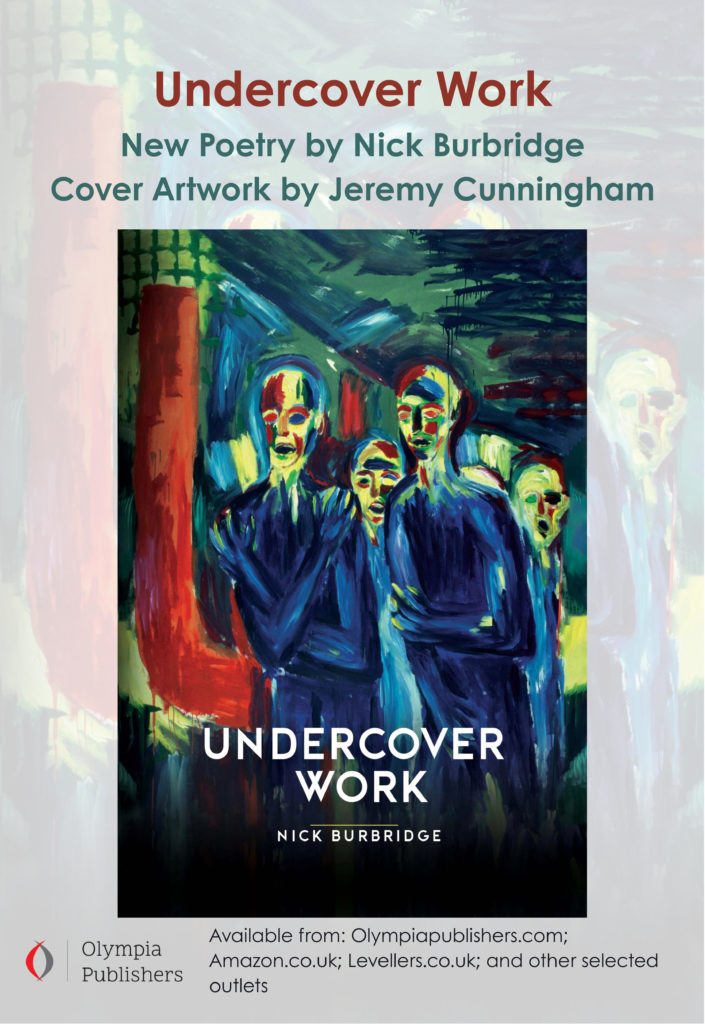NICK Burbridge’s Undercover Work, his fourth collection, comprises a series of poems that explore various themes this poet, songwriter, novelist, and playwright has written about elsewhere.
Burbridge is the laureate of those working in the margins: undercover officers, mad poets, those blighted by the indifference of society, and in poems both in form and in free verse Burbridge maps out his territory.
The undercover officers arrive early: ‘Out of Ashford Barracks in an unmarked van the new squad/of undercover men…/pilgrim to Canterbury for a last dry run.’
They’re headed for the six counties and in poems with titles such as Tour of Duty, The Whisteblower’s Waltz, and Dirty Peace Burbridge seeks to inhabit the minds of those sent in to police the North when the Troubles first broke with the burning of the Bogside.
Towards the end of this sequence scattered throughout Undercover Work we arrive at Burbridge’s own view of recent history: ‘Civil wars are lost when they begin.’
If, as Coventry Patmore said, the end of art is peace, it is largely thanks to poets like Burbridge that the peace process found a precise articulation and succeeded after so many years of the Troubles.
But what about the legacy of the mindless violence that was perpetrated in the cause of nationalism? Even here on the ‘mainland’ the psychological effects of ‘civil war’ can be felt.
Burbridge creates an alter ego, Dublin Flynn, who weaves in an out of the collection, a man shaken to his core by ‘civil war’.
He makes his first appearance in Brighton Rock (Flynn on Patrol), that martial word, ‘patrol’, linking Flynn to the ‘undercover officers’: ‘Flynn glanced up at the star-strewn sky, distracted/by the subtle motion of the seasons, and a sense of what is past and yet to come.’
He's attacked in his local park by a ‘gang of addicts’, and ends as ‘minor tragedy./One more exhibit on the fringe’.
Flynn’s various skirmishes are at once funny and sad, but Flynn is at heart a comic character, a restless frequenter of bars and sessions, a survivor where all around him is falling apart.
It is his optimism of the heart that keeps him going.
The lyricism of ‘star-strewn sky’ shows what Burbridge is capable of, and elsewhere in the collection a similar lyricism is at work:
Among sown fields I walk alone
waiting for news. This is my pitch.
I am your grandfather; I’ll watch
over the paths you are set on
but your map’s not my concern.
(Celtic Knot)
In The Maze, Burbridge brings together this hard-won lyricism with his political concerns to fine effect:
So I watched his neck bend
and his limbs racked and torn.
Somewhere a bell was rung.
This note I send to
to the dead and unborn.
One day we will all be sprung.
Burbridge can do everything as a poet, from political and personal lyric poetry to elegy.
His poem for Dubliner Gabriel Duffy (1942–2008), author of the autobiography From Sham To Rack is very moving: ‘when these footholds I have fought to keep/dissolve… and I’m washed up on the black strand/where all drifters end, let me find you…’ (From Sham To Rock).
At the heart of the collection is Nursery As Ashram.
For some years, besides his work in the arts, Burbridge has worked in a nursery in Brighton, and Nursery As Ashram conveys in vivid images some sense of what this work has been like: ‘Seasons unfold, and the shrill flock/beat a worn trail to the nearby park/as they have for decades, as they will.’ Burbridge’s focus on children here, after the darker poems of troubled operatives and operators, is both touching and affecting.
One wonders if Burbridge might write a children’s book next, a collection to rank alongside Lear and Causley and Rosen. With the great gifts Burbridge has at his disposal it wouldn’t surprise me.
Undercover Work, Nick Burbridge, Olympia Publishers, £11.99

